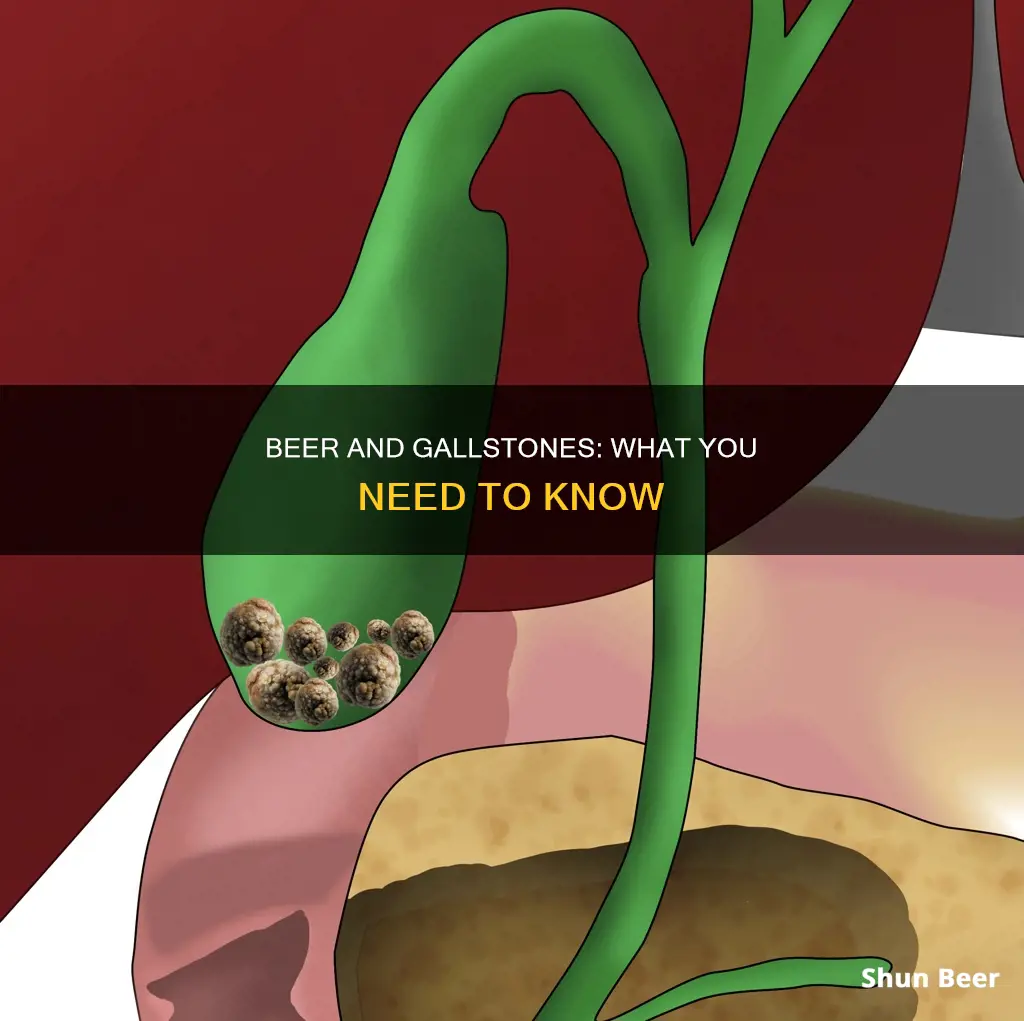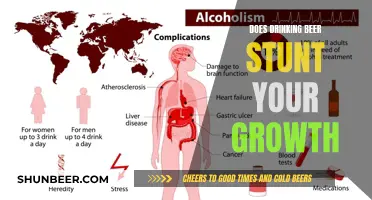
Alcohol consumption has been linked to a reduced risk of gallstones, according to some studies. However, other research suggests that alcohol may slow down the gallbladder. While moderate drinking may have a positive effect on gallbladder health, heavy drinking can have negative consequences.
The gallbladder is a small organ located under the liver that stores bile, a substance that aids in fat digestion. Gallstones are hard deposits that can form in the gallbladder, blocking bile ducts and causing pain.
Research suggests that moderate alcohol consumption may reduce the risk of gallstones. A 2019 review of 24 studies found a link between moderate drinking and a lower risk of gallstones. However, the effect of alcohol on the gallbladder is not yet fully understood, and there is conflicting evidence regarding the impact of alcohol on gallbladder emptying.
While moderate drinking may have potential benefits for the gallbladder, heavy drinking can have negative consequences. Heavy drinking is associated with an increased risk of liver cirrhosis, which can lead to gallstone formation. Additionally, individuals with acute pancreatitis caused by gallstones should avoid drinking, as it can worsen the condition.
In conclusion, while moderate alcohol consumption may reduce the risk of gallstones, heavy drinking can have negative effects on the gallbladder and overall health. It is important to drink in moderation and consult a healthcare professional if you have any concerns about your alcohol consumption or gallbladder health.
| Characteristics | Values |
|---|---|
| Can alcohol cause gallstones? | There is no evidence that alcohol can cause gallstones. |
| Can alcohol prevent gallstones? | Limited research suggests that moderate alcohol consumption may lower the risk of gallstones. |
| Can heavy drinking lead to gallstones? | Heavy drinking can indirectly lead to gallstones. |
| Can alcohol consumption cause other gallbladder issues? | Alcohol consumption can cause problems with gallbladder emptying, low levels of bile salts in bile, sudden weight loss, and increased levels of bilirubin and cholesterol in bile. |
| Can you drink alcohol if you have gallstones? | If you have gallstones, you should avoid drinking alcohol until your physician says it is safe to do so. |
What You'll Learn

Research suggests that moderate alcohol consumption may reduce the risk of gallstones
According to the Centers for Disease Control and Prevention (CDC), moderate alcohol consumption is defined as one drink per day for women and two drinks per day for men. This is significantly different from binge drinking, which is classified as consuming four or more drinks in a short period for women, and five or more drinks for men. Binge drinking can lead to heavy drinking, which the NIAAA defines as consuming four drinks per night or 14 drinks per week for men, and three drinks per night or seven drinks per week for women.
While there is limited research suggesting a link between moderate alcohol consumption and a reduced risk of gallstones, the exact mechanism of this effect is not yet fully understood. Some theories suggest that alcohol consumption may increase the rate at which the gallbladder empties, reducing the amount of bile that can form gallstones. However, other studies contradict this theory, finding no difference in gallbladder emptying between drinkers and non-drinkers, or even suggesting that alcohol slows down gallbladder emptying.
It is worth noting that the potential benefits of moderate alcohol consumption on gallstone risk must be weighed against the well-established negative effects of excessive drinking on overall health. Excessive alcohol consumption is associated with an increased risk of liver disease, pancreatitis, and other serious health issues. Additionally, individuals with existing gallbladder problems, such as gallstones, should avoid drinking alcohol until advised otherwise by their physician.
Beer and Ice Cream: A Delicious Combination or a Disaster?
You may want to see also

Heavy drinking can indirectly lead to gallstones
Firstly, heavy drinking can cause cirrhosis, which is a common issue among heavy and chronic drinkers. Cirrhosis is a type of liver scarring that can lead to the formation of gallstones. About one-third of people with cirrhosis develop gallstones.
Secondly, heavy drinking can cause acute pancreatitis, which can be made worse by the presence of gallstones. In addition, heavy drinking can lead to sudden weight loss, which increases the risk of developing gallstones.
Thirdly, while there is limited research on the direct effects of heavy drinking on the gallbladder, some studies suggest that alcohol consumption may slow the gallbladder. A small 2013 study found that alcohol may slow down gallbladder emptying.
Therefore, while moderate alcohol consumption may have a protective effect against gallstones, heavy drinking can indirectly increase the risk of gallstone formation through its negative effects on the liver and pancreas, as well as its impact on weight loss.
Exploring the Limits: 50 IPAs, a Safe Challenge?
You may want to see also

Alcohol consumption is not recommended for those with gallstones
Alcohol Consumption and Gallstones
Overview
Excessive alcohol consumption is known to have detrimental effects on the body and can increase the risk of various health conditions. While moderate alcohol consumption may provide certain health benefits, it is important to understand its impact on specific health conditions, such as gallstones.
The Gallbladder and Gallstones
The gallbladder is a small, pear-shaped organ located under the liver and next to the pancreas. Its primary function is to store and release bile, a liquid produced by the liver that aids in the digestion of fats. Gallstones are hard deposits, often consisting of cholesterol, that form in the bile stored in the gallbladder. These gallstones can block the bile ducts, leading to complications such as biliary colic, acute cholecystitis, and acute cholangitis.
Alcohol's Impact on Gallstones
While some research suggests that moderate alcohol consumption may reduce the risk of gallstone formation, the evidence is limited and inconclusive. On the other hand, heavy alcohol consumption can indirectly contribute to the development of gallstones and exacerbate existing symptoms. Alcohol's impact on the gallbladder is not yet fully understood, and more research is needed to determine the exact effects of alcohol consumption on gallbladder functioning.
Recommendations for Individuals with Gallstones
For individuals who already have gallstones or are at risk of developing them, it is generally recommended to avoid alcohol consumption or drink within the moderate limits suggested by healthcare professionals. Heavy drinking, defined as binge drinking on five or more days in the past month, can increase the risk of gallbladder problems and pain. Additionally, alcohol consumption can worsen symptoms for individuals who develop acute pancreatitis due to gallstones.
While moderate alcohol consumption may have a neutral or slightly positive effect on gallstone risk, the potential benefits do not outweigh the risks associated with excessive alcohol intake. Therefore, it is essential to consume alcohol in moderation or abstain completely, especially for individuals with existing gallbladder problems or those at high risk of developing gallstones.
Beer Drinking and Avoiding the Gut
You may want to see also

Alcohol may slow gallbladder emptying
While moderate alcohol consumption may lower the risk of gallstones, research has shown that alcohol may slow down gallbladder emptying.
The gallbladder is a small, pear-shaped organ located under the liver. It is part of the biliary system, which includes the liver and pancreas, and is responsible for producing, storing, and releasing bile, which aids in fat digestion.
Alcohol consumption is a known risk factor for various health conditions, and excessive drinking can lead to serious negative effects on health. However, research has indicated that moderate alcohol consumption may help prevent gallstones. Gallstones are hardened deposits, often comprised of cholesterol, that accumulate in the gallbladder, affecting 10-15% of people in the United States.
While the exact mechanism is unknown, one theory suggests that alcohol may increase the rate of gallbladder emptying, thereby reducing the amount of bile available for stone formation. However, this theory has not been supported by research. Instead, studies have found no difference in gallbladder emptying between drinkers and non-drinkers or have observed that alcohol slows down gallbladder emptying.
For example, a small 2013 study with 12 participants found that alcohol may slow down gallbladder emptying. Additionally, a 2014 study examined the effects of common alcoholic beverages (beer, red wine, and whisky) on gallbladder volume and found that red wine and whisky caused a delay in gallbladder emptying.
While moderate alcohol consumption may have potential benefits for the gallbladder, it is important to note that excessive alcohol consumption can have negative consequences for overall health. Healthcare professionals generally recommend consuming little to no alcohol to maintain good health.
Mixing Beer and Liquor: Safe or Not?
You may want to see also

Heavy drinking can cause cirrhosis, which can lead to gallstones
Excessive alcohol consumption can lead to alcohol-related liver disease (ALD), a preventable condition that results from drinking more alcohol than the liver can process. The liver, being responsible for breaking down alcohol, releases toxins that damage liver cells in this process. ALD can be fatal, causing more than 21,000 deaths annually in the United States alone.
There are three types of ALD: Alcoholic steatohepatitis (ASH), Alcoholic Hepatitis, and Alcohol-induced Cirrhosis. Cirrhosis is the most severe form of ALD and occurs when the entire liver is scarred, causing it to shrink and harden. This can lead to liver failure, and the damage is often irreversible. Typically, it takes 10 or more years of heavy drinking for cirrhosis to develop, with 10-20% of heavy drinkers developing the condition.
Now, how does cirrhosis lead to gallstones? The gallbladder is part of the biliary system, which includes the liver and pancreas. This system is responsible for producing, storing, and releasing bile, which is crucial for digesting fats. When the liver is affected by cirrhosis, its function is impaired, and bile production and flow can be disrupted. This disruption can cause a buildup of bile in the gallbladder, leading to the formation of gallstones.
While moderate alcohol consumption may be linked to a lower risk of gallstones, heavy drinking can indirectly increase the likelihood of gallstones by causing cirrhosis and disrupting the normal flow of bile. Therefore, it is essential to drink in moderation or abstain from alcohol to maintain a healthy gallbladder and liver.
Beer Drinking in California Public Parks: What's Allowed?
You may want to see also
Frequently asked questions
Research suggests that moderate alcohol consumption may reduce the risk of gallstones. However, heavy drinking can lead to cirrhosis, which increases the risk of gallstones. Therefore, it is recommended that individuals with gallstones avoid drinking alcohol until advised otherwise by a doctor.
Gallstones are hard deposits, often made of cholesterol, that form in the bile stored in the gallbladder. They can vary in size and number, and often cause no symptoms. However, when they block the bile ducts, they can cause pain in the upper right abdomen, usually after eating.
The most common symptom of gallstones is pain in the upper abdomen, which may radiate to the shoulder blade. Other symptoms include nausea, vomiting, sweating, increased heart rate, jaundice, itchiness, and mental confusion.







